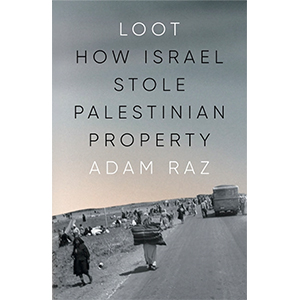Loot: How Israel Stole Palestinian Property
Exiled in 1948, Palestinians were robbed of their private property when looting became weaponized
During the 1948 War, Israeli fighters and residents alike plundered Palestinian homes, shops, businesses, and farms. This bitter truth was then suppressed or forgotten over the coming years.
Tens of thousands took part in the pillage of Palestinian property, stealing the belongings of their former neighbours. The implications of this mass looting go far beyond the personality or moral fibre of those who took part. Plundering served a political agenda by helping to empty the country of its Palestinian residents. In this context, it was part of the prevailing policy during the war – one designed to crush the Palestinian economy, destroy villages, and to confiscate and sometimes destroy crops and harvests remaining in the depopulated zones.
The participating Jewish public became a stakeholder, motivated to prevent Palestinian residents from returning to the villages and cities they had left. These ordinary people were mobilized in the push for the segregation of Jews and Arabs in the early years of statehood.
With painstaking original research into primary sources, Adam Raz has brought to light a tragic moment in the history of a conflict that roils the region and the wider world. As the details of the Nakba are understood and documented, redress for Palestinian grievances comes closer to reality.
RM140.00
Out of stock
Description
Exiled in 1948, Palestinians were robbed of their private property when looting became weaponized
During the 1948 War, Israeli fighters and residents alike plundered Palestinian homes, shops, businesses, and farms. This bitter truth was then suppressed or forgotten over the coming years.
Tens of thousands took part in the pillage of Palestinian property, stealing the belongings of their former neighbours. The implications of this mass looting go far beyond the personality or moral fibre of those who took part. Plundering served a political agenda by helping to empty the country of its Palestinian residents. In this context, it was part of the prevailing policy during the war – one designed to crush the Palestinian economy, destroy villages, and to confiscate and sometimes destroy crops and harvests remaining in the depopulated zones.
The participating Jewish public became a stakeholder, motivated to prevent Palestinian residents from returning to the villages and cities they had left. These ordinary people were mobilized in the push for the segregation of Jews and Arabs in the early years of statehood.
With painstaking original research into primary sources, Adam Raz has brought to light a tragic moment in the history of a conflict that roils the region and the wider world. As the details of the Nakba are understood and documented, redress for Palestinian grievances comes closer to reality.
Publisher: Verso
Hardback
2024
ISBN: 9781804295151






